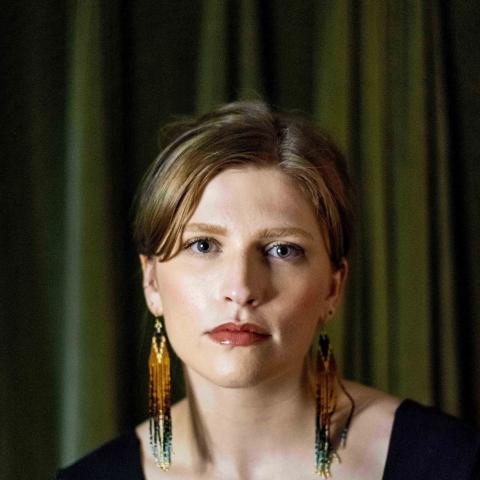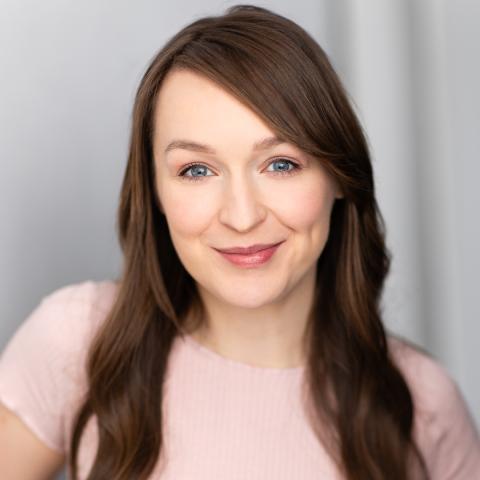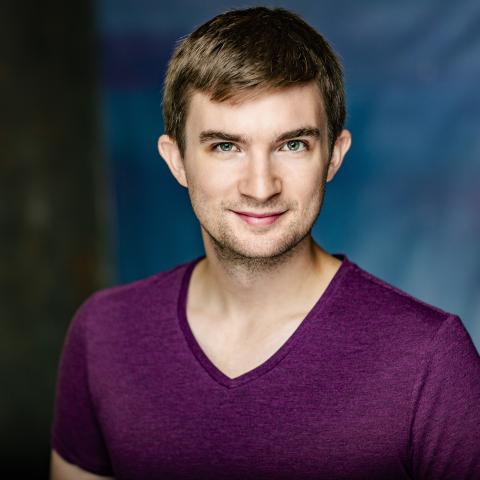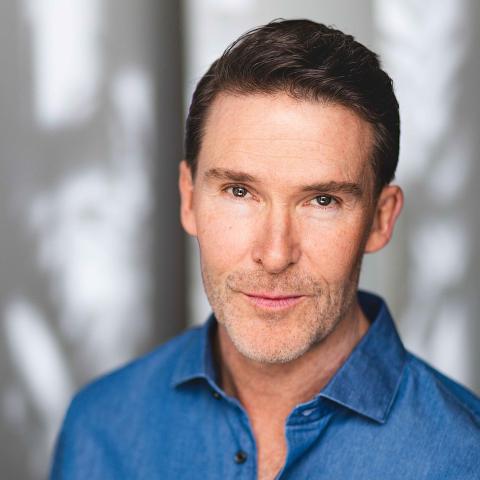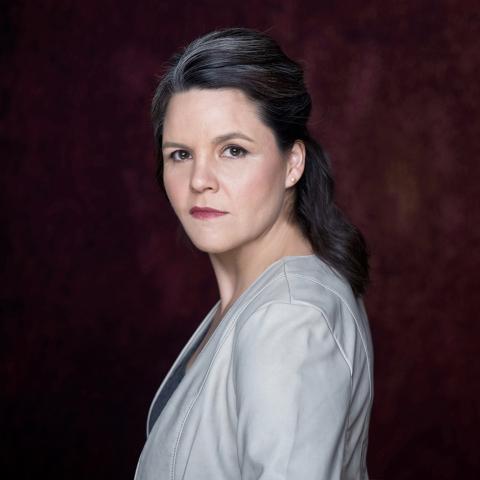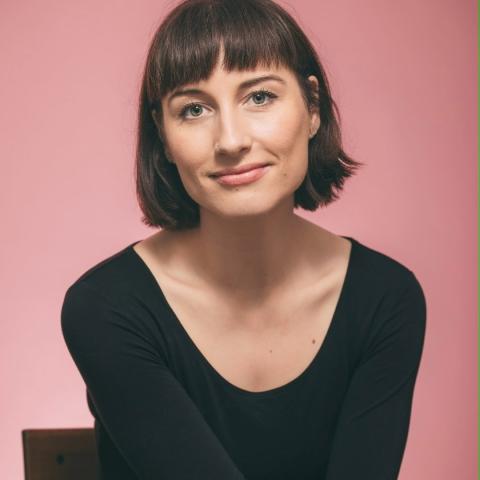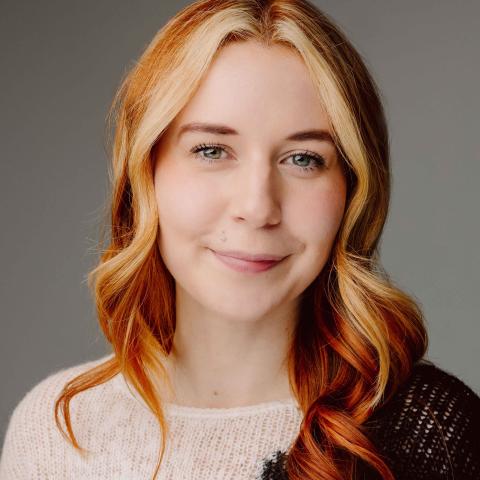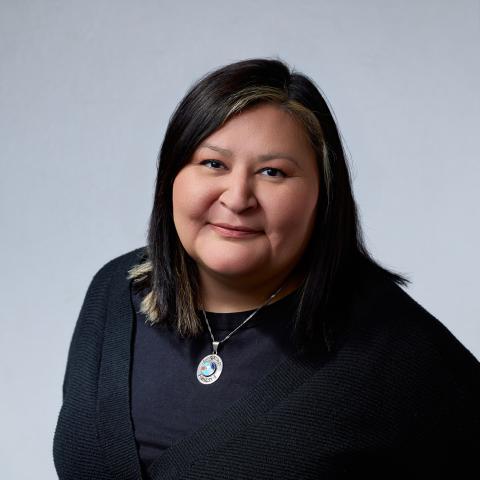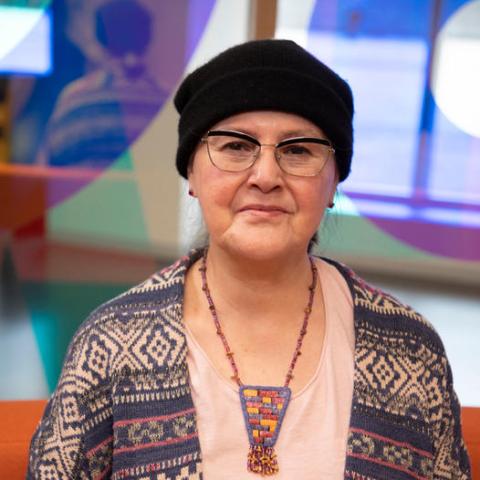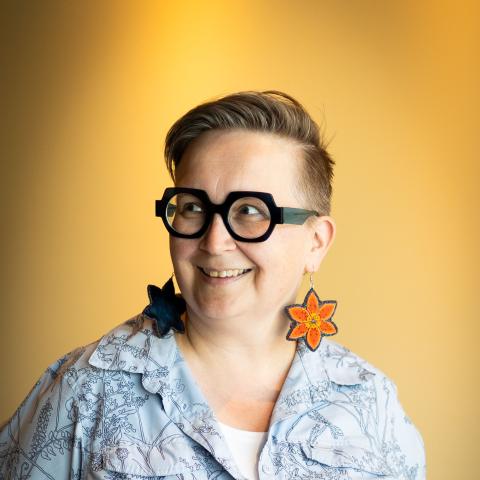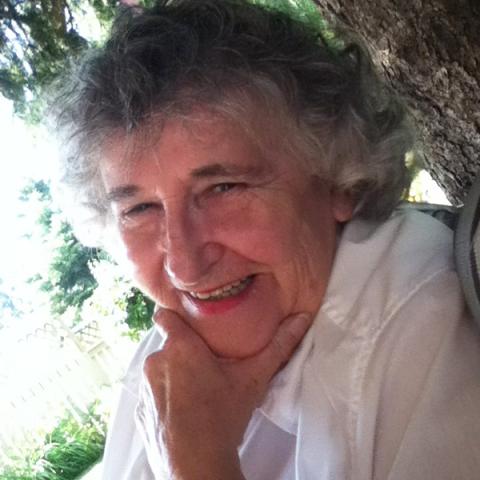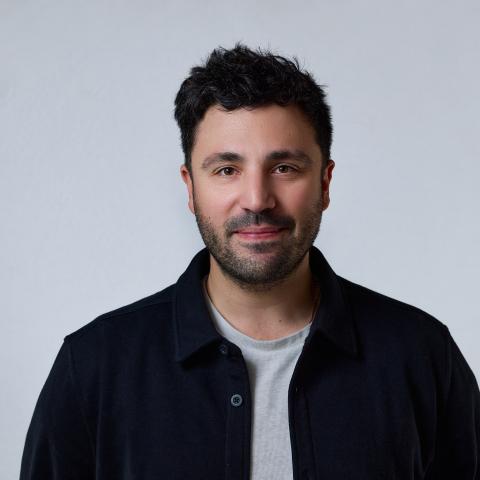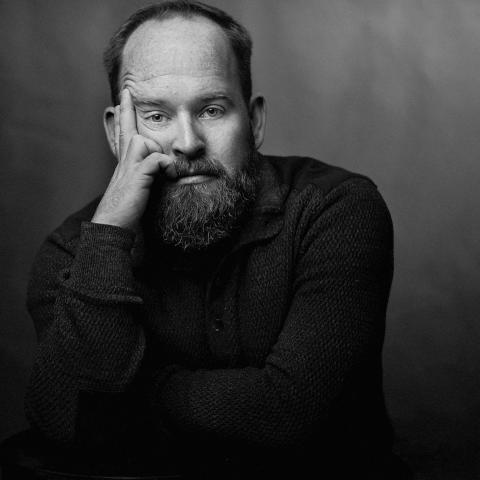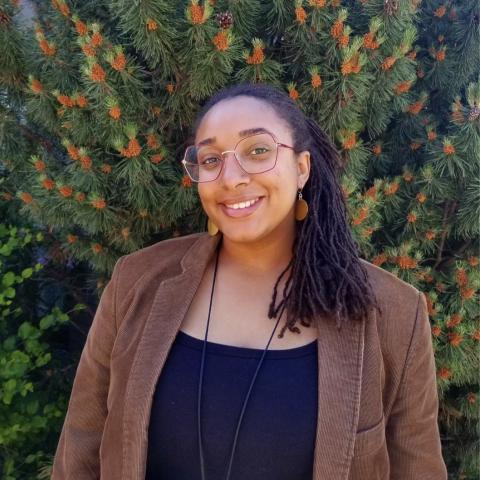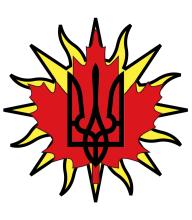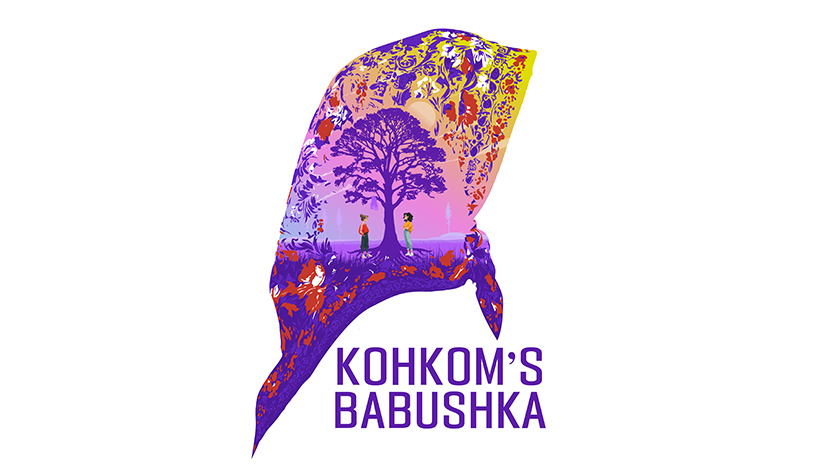
Artistic Credits
Starring
Kohkom's Babushka
A magical Métis - Ukrainian tale about the scarves that connect our cultures
Written by Joleen Ballendine & Lianna Makuch
Inspired by the story by Marion Mutala
Banff Centre for Arts and Creativity is proud to present Kohkom's Babushka, a new family theatre production developed in collaboration with Pyretic Theatre, Pemmican Collective, and Punctuate! Theatre.
When feuding tweens—Paulette, who’s Métis, and Natalia, who’s Ukrainian—are forced to team up to protect a beloved tree from being cut down, they are accidentally transported back to the turn of the 20th century. The girls find themselves caught in an unfamiliar world and must discover a way to cooperate if they want to find their way back home. Along the way, they discover connections between their two cultures through music, dance, and their values, and craft the beginnings of a new and profound friendship.
Inspired by the work of prairie author Marion Mutala, Kohkom’s Babushka re-examines the legacies of traditional Canadian settler stories, fostering dialogue that celebrates both differences and shared values. It highlights the beauty of cultural traditions, the spirit of generosity, and the enduring power of friendship.
Join Banff Centre for this family production, great for ages 8+.
The New Play Productions are generously funded by The Slaight Family Foundation.
About the Program
The Slaight Family Foundation support of Theatre Arts at Banff Centre
This week’s world premieres of The Legend of Sleepy Hollow and Kohkom's Babushka are made possible through the generous support of The Slaight Family Foundation. Their significant donation to Banff Centre for Arts and Creativity directly supported theatre creators, producers and presenters as the sector recovers from pandemic-related closures. Thanks to The Slaight Family Foundation, Banff Centre has the opportunity to support residencies for Canadian playwrights, workshopping and development and presentation of two world premieres alongside partner Alberta organizations and Acting, Stage Management and Theatre Producer training intensive programs.
You can learn more and purchase tickets for The Legend of Sleepy Hollow at this link.
In 2022, The Slaight Family Foundation donated $15 million in total to 22 Canadian organizations, Banff Centre was the only one chosen outside of Ontario.
About the Company
ABOUT PUNCTUATE:
Punctuate! Theatre is a Dora Mavor Moore Award (Toronto) and Elizabeth Sterling Award (Edmonton) -winning theatre company. Led by Artistic Director Matthew MacKenzie, our company endeavors to create accessible, relevant and subversive theatre that entertains and provokes thought amongst diverse audiences. Other world premieres include Takwahiminana, First Métis Man of Odesa, BEARS, After The Fire, The Particulars, Bone Wars, and Minosis Gathers Hope. Our work has been seen across Turtle Island at the National Arts Centre, Soulpepper, Talk Is Free Theatre, Factory, Royal Manitoba Theatre Centre, Persephone, Citadel, The Cultch, Belfry, and we are so proud to be working with the incredible Banff Centre of Arts and Creativity and our friends at Pyretic Productions to bring the world premiere of Kohkom’s Babushka to life in this incredible setting. Don’t forget to catch Punctuate’s next show Strife at Tarragon Theatre in Toronto, premiering April 2026.
@PunctuateTheatre
Punctuate! Staff
Matthew MacKenzie | Artistic Director
Andy Cohen | Senior Creative Producer
Simon Bracken | Director of Fund Development
Chelsea Mahon | Finance Manager
Danielle LaRose | Artist Development Producer
Trent Crosby | Production Manager & Technical Director
Jo-Ann Saddleback | Resident Elder
Teniel Whiskeyjack | Community Liaison
ABOUT PYRETIC:
Pyretic Productions is an Edmonton-based, nationally minded independent theatre company dedicated to presenting boundary-pushing contemporary theatre.
Our critically-acclaimed, award-winning new work has been performed in Edmonton, Toronto (Summerworks, Next Stage, Company Blonde), Canmore (artsPlace), Lethbridge (New West Theatre), Summerland BC (Ryga Arts Festival), Kyiv Ukraine (Wild Theatre), and New York City (United Solo Festival). Recent productions include Barvinok by Lianna Makuch, Alina by Lianna Makuch, and Bomb by Natalka Blok. Upcoming: the world premiere of The Division by Andrew Kushnir, co-produced with Project: Humanity at Crow’s Theatre.
Company members have travelled several times throughout Ukraine to research and develop our productions Barvinok and Alina by Lianna Makuch. The company was the first Canadian artists-in-residence at the IZOLYATSIA Cultural Platform in Kyiv, Ukraine in February 2020.
@Pyretic.Theatre
Message from Director/Playwright
A Note from Co-Writers Lianna Makuch and Joleen Ballendine:
This is a story about friendship. And a good friend is hard to find.
Our own friendship began in 2001 in the halls of Avalon Junior High School in Amiskwaciwâskahikan (Edmonton). We soon discovered we lived just two doors apart, and after our first walk home together, we were inseparable. From drama class creations to after-school soap operas, sleepless sleepovers, nervous school dances, crushes, heartache, we shared our fears, our tears, and—of course—laughter. The kind of laughter that brings you to tears. We’ve grown up side by side, for the good times, hard times, and everything in between.
It feels only natural that we were drawn to this story, inspired by the timeless book by Mariona Mutala, Kohkum’s Babushka: A Magical Métis/Ukrainian Tale. Babushka refers to the traditional Eastern European bright, floral headscarf. On the Prairies, the word babushka has become part of local vernacular, though in Ukrainian it’s called a khustka. However, throughout our development process, we discovered that even the title Kohkom’s Babushka has opened many conversations around reconciliation. In Western Canada, babushka is commonly used to describe the bright, floral headscarves we all recognize. Yet it is also the Russian word for grandmother—and since the full-scale invasion of Ukraine, there has been growing recognition of the need to derussify language and reclaim Ukrainian culture. This has raised important questions about whether babushka is the right word to use, or if the Ukrainian khustka would be more appropriate.
At the same time, we’ve also encountered stories that layer this question. Author Marion Mutala recalls in the Author’s notes of her book how an Indigenous man, Kelly O’Kanee, approached her booth at a literary festival where she was selling her “Baba’s Babushka” books and said, “Babushka, that is a Cree word. Pootishka means ‘she is wearing.’ It is either pronounced babushka or pootishka.” His words inspired her to write a story about the scarf that connects our cultures. The shared pronunciation hints at a history deeper than we first imagined. Elder Jo-Ann Saddleback has also shared with us that these scarves existed on these lands and were used by Indigenous people long before Ukrainians arrived. This discovery—that both the word and the object carry meaning here beyond Ukrainian culture—is one of the central reasons we have chosen to keep babushka in the title. For us, it reflects a deeper shared history and invites audiences to engage with the complexities of linguicide, reconciliation, and the places where our stories intersect.In this story, the babushka is not just clothing, but a living connection between generations and cultures.
This story speaks deeply to our own roots—Ukrainian and Métis—and to the journey of our nearly 25 years of friendship. In these characters, we catch glimpses of ourselves, and creating this play has been as much about rediscovering who we are as friends as it has been about bringing this story to life.
For Lianna, raised in Ukrainian culture, it has meant facing new conversations about the colonial role of her community in Canada. Ukrainians are often celebrated for helping to “build” this country, yet our role as settlers is less often acknowledged in the context of reconciliation. This story offers a chance to lean into those complexities and to spark dialogue about where our histories meet Indigenous experiences, especially for intergenerational audiences. With many new Ukrainians arriving because of Russia’s full-scale invasion, it feels urgent to reflect honestly on these histories. The resilience of Ukrainians fighting for sovereignty offers new ways to think about Indigenous struggles for decolonization here.
For Joleen, this play has been a way to step more fully into her Métis heritage—something she has long sought after. Like many Métis families it hasn’t always been easy, and so much of her family's story has been lost, forgotten, or buried. Now, as a mother, she wants to create something joyous and meaningful for her young son, Bo Ballendine. This story has been a way to do that: to honour cultural roots while offering hope and laughter to the next generation.
And laughter matters. While Kohkom’s Babushka holds big ideas for little people, it was always important that it not feel like a history lesson. We believe joy and grief live alongside one another, and so we’ve woven humour throughout—keeping the story playful and alive, even as it carries deeper truths. We invite you to open your hearts, and to embrace joy and laughter along the way.
Whenever we have come together to work on this show, we have found we’ve learned some profound lessons. One teaching that has stayed with us is the story of buffalo: when a storm approaches, unlike other animals who turn and run away, buffalo run straight into it. By facing the storm head-on, they pass through more quickly, with less suffering. This story, too, runs toward the storm—inviting us to face colonialism, the true meaning of reconciliation, and our shared history with courage and strength, so we might move through it together.
Kohkom’s Babushka is a celebration of Métis and Ukrainian cultures. It tells a story of cultural preservation for two communities that have historically faced genocide, and who both continue to do so. Now, more than ever, it feels essential to honour these stories of reconciliation with both recognition and celebration, and to imagine our way forward through understanding, respect, and friendship.
We hope you leave with your hearts a little fuller. For us, Kohkom’s Babushka has been a joyful act of discovery—of our cultures, of our friendship, and of ourselves. Creating it together has been a gift. Thank you for allowing us to share it with you.
Maarsi // Дякую,
The playwrights wish to thank:
Matthew Wishart MacKenzie, Amiel Gladstone, Marion Mutala, Jo-Ann & Jerry Saddleback, Brett Dahl, Matt McGeachy, Tracy Carroll, Caroline Howarth, Sprouts Festival and Concrete Theatre, Sheiny Satanove, Luke Thomson, Bo Ballendine, Nestor Makuch, Sonia Maryn, Natalia Makuch, Kalen Lumsden, Mariya Khomutova, Ivan MacKenzie, Danielle LaRose, Valerie Planche, Amber Borotsik, Jesse Gervais, Tanya Pacholok, Matthew Lumley, Leon Hunter, Maija Corrigan, John Avila, James Allen, Jack Hunting, Ocean Pettigrew, Shane Saunderson, Rebecca Sadowski, Chris W. Cook, Gianna Vacirca, Maya Baker, the staff and faculty at the Banff Centre for Arts & Creativity, the team with Punctuate! Theatre and Pemmican Collective, Rapid Fire Theatre, Patrick Lundeen, Dawn Marie Marchand, Ann Hardy, Lilyrose Meyers, the Slaight Family Foundation, Larisa Hayduk, Maryna Chernyavska, Naomi McIlwraith, Myrna Kostash, Indigenous Ukrainian Relationship Initiative, the participants of the Slaight New Play Actor Training 2024, Rose Napoli, Beth Kates.
